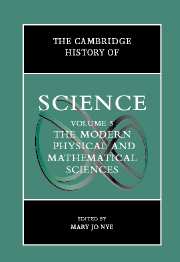Book contents
- Frontmatter
- Introduction: The Modern Physical and Mathematical Sciences
- Part I The Public Cultures of the Physical Sciences After 1800
- Part II Discipline Building in the Sciences: Places, Instruments, Communication
- Part III Chemistry and Physics: Problems Through the Early 1900s
- Part IV Atomic and Molecular Sciences in the Twentieth Century
- 17 Quantum Theory and Atomic Structure, 1900–1927
- 18 Radioactiviy and Nuclerar Physics
- 19 Quantum Field Theory: From QED to the Standard Model
- 20 Chemical Physics and Quantum Chemistry in the Twentieth Century
- 21 Plasmas and Solid-State Science
- 22 Macromolecules: Their Structures and Functions
- Part V Mathematics, Astronomy, and Cosmology Since the Eighteenth Century
- Part VI Problems and Promises at the End of the Twentieth Century
- Index
- References
21 - Plasmas and Solid-State Science
from Part IV - Atomic and Molecular Sciences in the Twentieth Century
Published online by Cambridge University Press: 28 March 2008
- Frontmatter
- Introduction: The Modern Physical and Mathematical Sciences
- Part I The Public Cultures of the Physical Sciences After 1800
- Part II Discipline Building in the Sciences: Places, Instruments, Communication
- Part III Chemistry and Physics: Problems Through the Early 1900s
- Part IV Atomic and Molecular Sciences in the Twentieth Century
- 17 Quantum Theory and Atomic Structure, 1900–1927
- 18 Radioactiviy and Nuclerar Physics
- 19 Quantum Field Theory: From QED to the Standard Model
- 20 Chemical Physics and Quantum Chemistry in the Twentieth Century
- 21 Plasmas and Solid-State Science
- 22 Macromolecules: Their Structures and Functions
- Part V Mathematics, Astronomy, and Cosmology Since the Eighteenth Century
- Part VI Problems and Promises at the End of the Twentieth Century
- Index
- References
Summary
There is a common trait in reviews by plasma- and solid-state physicists of their specialties: an emphasis on the ubiquity of the subject matter with which they are concerned. “As we now know, planet Earth is but a small non-plasma island in a vast sea of plasma. Though tenuous in outer space, plasma is dense and omnipresent in the stars and in their coronas. In fact this ‘fourth state of matter’ – plasma – is seen as the dominant form of matter in the Universe,” a pioneer of plasma physics writes in a review about his discipline. With the same zeal but a slightly different emphasis, a German solid-state protagonist has created a link between the omnipresent solid matter and human culture: “Solid substances have given their names to the great historical epochs of mankind. Stone, bronze, and iron have caused epochal changes,” he begins in a book on the history of solid-state electronics. Now, at the end of the iron age, we are entering a new era. “Probably this epoch will be given the name of the crystal.… This new epoch perhaps will be called silicon age.”
What is the message behind such a “ubiquity” rhetoric? Beyond the pleading for recognition, funds, and other means of furthering plasma and solid-state physics, are we supposed to consider research in those omnipresent substances as a cultural obligation? In contrast to specialties like elementary particle physics, which appear to the public as more fundamental, the study of plasmas is regarded as a corollary to the quest for controlled thermonuclear fusion. Similarly, solid-state physics seems to derive its importance more from technological applications than from intellectual curiosity.
- Type
- Chapter
- Information
- The Cambridge History of Science , pp. 413 - 428Publisher: Cambridge University PressPrint publication year: 2002
References
- 1
- Cited by

